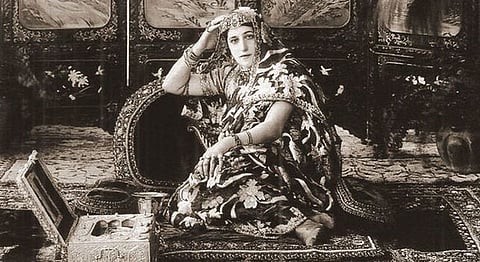
- HOMEGROWN WORLD
- #HGCREATORS
- #HGEXPLORE
- #HGVOICES
- #HGSHOP
- CAREERS
- ABOUT US
- CONTACT US

Once upon a time, in a land far, far away, a young Spanish girl found herself on the receiving end of a handsome Prince’s attention and affection. He was Jagatjit Singh, the Maharaja of Kapurthala, a former princely state in India. She was from a lower middle class family from Malaga, wanting of both money and stability. Her ordinary existence was exemplified by her callous ways (she once drank the water served in a finger bowl, according to Independent UK), little to no education, and an undistinguished vocation as a flamenco dancer. It was during one of her stints performing a dance sequence in a Madrid nightclub that the then 34 year old Maharaja of Kapurthala spotted the 16 year old Anita Delgado. Smitten, the Maharaja began his extensive, and very expensive, courtship of the teenage dancer. Her family, at first resistant of the much older Prince’s advances, eventually succumbed when he offered a massive sum of money in return for Anita’s hand in marriage. The couple tied the knot in a tradition Sikh wedding in the Prince’s hometown of Kapurthala.
Like a whirlwind modern day fairy tale, Delgado’s life transformed overnight as she embraced her role as the Maharani of Kapurthala. Nestled in the foothills of the Himalayas, the newly married Maharani was treated to every luxury the world had to offer - personalised jewels from Cartier, a posse of maids and ladies’-in-waiting, and all the privileges that came with the respect and dignity afforded to her esteemed position in the Royal hierarchy. Though the fifth wife of the Prince, she was said to be his favorite, as exemplified by the extensive travelling the couple undertook together in the formative years of their marriage.
In preparation for her cultural overhaul, Delgado learned French and English, in addition to being trained in horse riding and music, the preferred royal past-times. She became adept at the art of entertaining International guests and was quite a success at formal events and banquettes. Her social graces were honed to the point where you could no longer detect a hint of her humble beginnings in her refined speech and mannerisms.
The couple travelled all over the world and eventually the queen gave birth to a son, Ajit Singh. It was all sunshine and rainbows in the literal kingdom of Anita Delgado when, amidst rumours of an affair with her step son, the couple separated and Delgado was sent back to Spain with a generous pension to support her for the rest of her life, and then some. Though the legitimacy of the rumours was never proved and the descendants of the Queen vehemently deny it, the degrading claims managed to elevate Delgado’s story from a simple rag to riches tale to a scandalous saga that reads like a movie script.
It captured the imagination of every young girl in Spain who yearned to escape her tribulations by getting whisked away by a handsome Prince from a foreign land. Though little known in India, the Anita Delgado story enjoyed unparalleled popularity in Spain, almost to the point of becoming an urban legend. After her death in 1962, and the subsequent death of her son Ajit in 1982, the Queen’s memory was largely fading from collective public memory until Javier Moro, a renowned Spanish author, decided to revive it through his novel Passion India. With all the makings of a successful book at his disposal - royalty, poverty, romance, travel, luxury, scandal - Moro describes the opulent life of the Maharani and the fateful affair in delicious detail. The rights to make his book into a feature film were bought by Spanish Superstar Penelope Cruz who intended to collaborate with Bollywood stars for a large scale project. This was, however, met by instant protest from the Maharani’s descendants who claimed the alleged affair described in the book to be false and offensive to the memory of their ancestors. Threatening legal action, they were successful in compelling Cruz to pull the brakes on her film. Dismissed as a sensationalised account of the Queen’s life, the movie never saw the light of day, even though Moro’s book enjoyed considerable success in both the Indian and Spanish markets.
If you enjoyed this piece we suggest you read:
